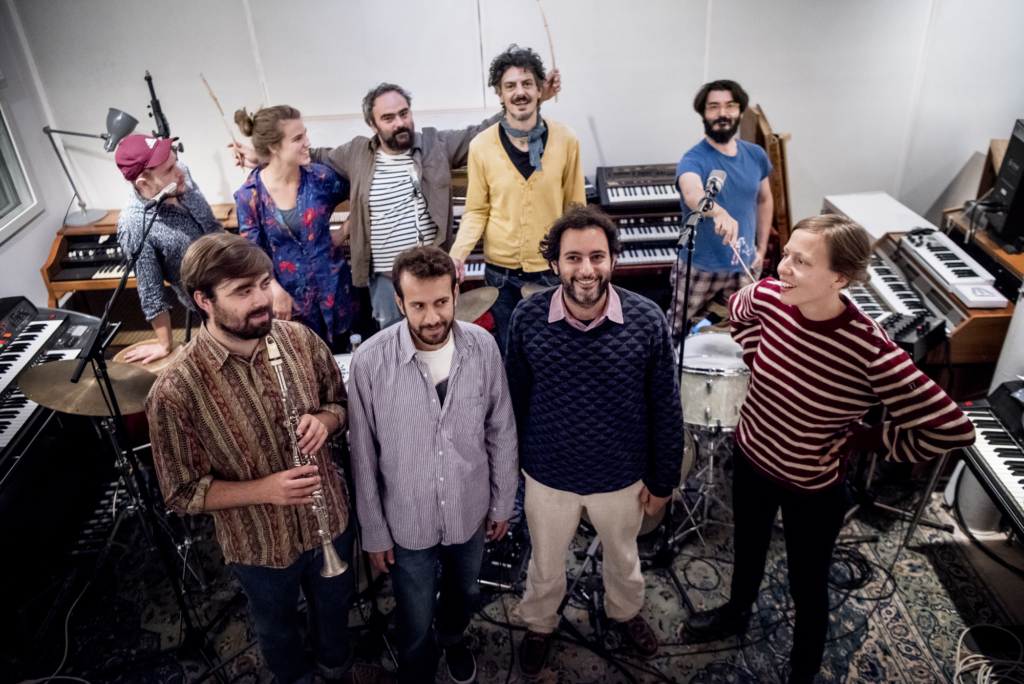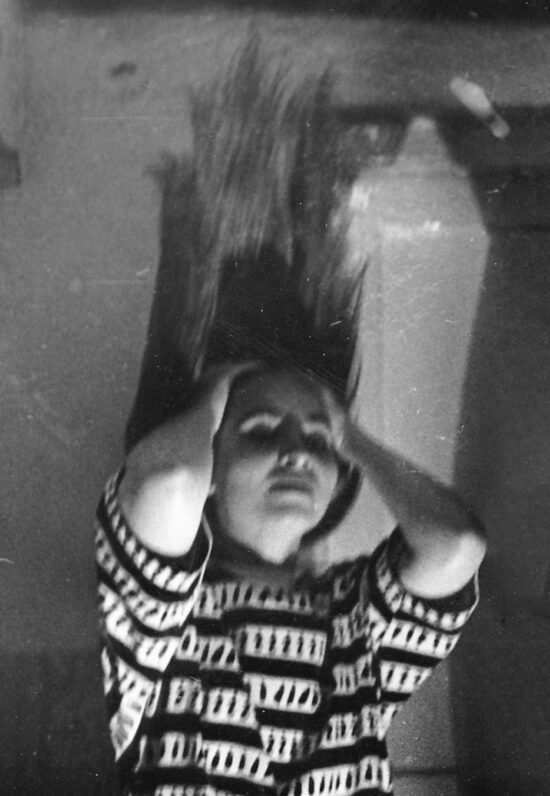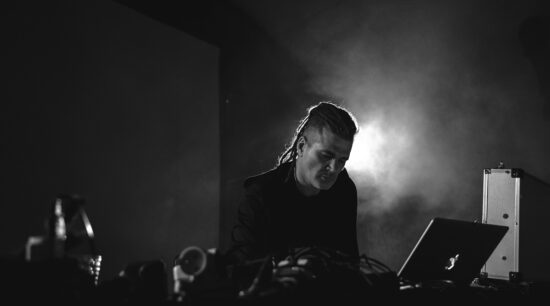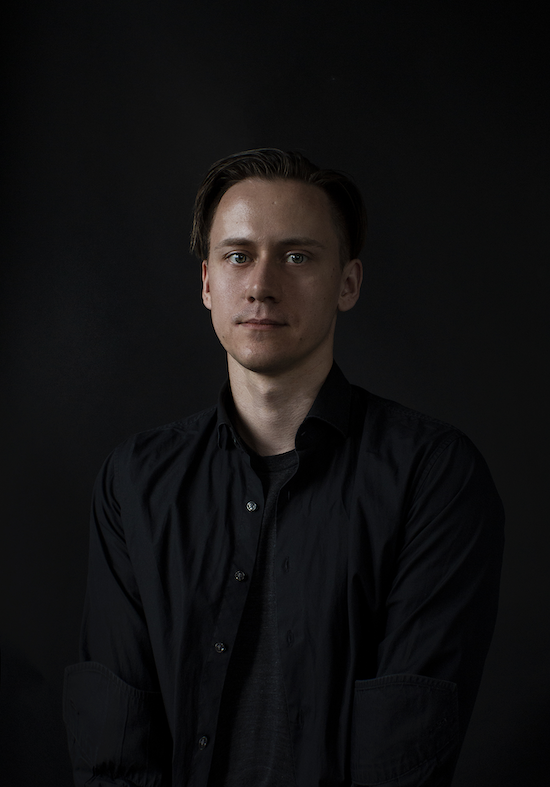„I became bored with the guitar, so I tried to make it sound like something else. I bought a synthesizer, drum machine and after a few years… I came back to the guitar. If I play it now, I like it to have a clean sound, I don’t use a lot of effects because. In a way I think that Elephantine was kind of being inspired by an instrument again.”
Translation: Aleksandra Szkudłapska
Maurice Louca is active in many bands, and when he finally releases a solo record, it turns out to also be the result of working with other musicians. The artist admits that meeting with others on stage, in the rehearsal room or the studio is what he finds most important. This aspect consistently present on the albums of such bands as Karkhana, Dwarfs of East Agouza or Lekhfa, where Louca plays with artists from various musical worlds. He does not choose his co-workers at random – mutual understanding, and an end-result that isn’t always predictable, seem to be the driving force behind his music, whether he plays with singer Maryam Saleh, improvisers Mazen Kerbaj and Sharif Sehnaoui, Sam Shalabi or founder of Sun City Girls, Alan Bishop. Yet Louca also makes music on his own – this was the case of Garraya, a very electronic album released three years ago. Louca’s subsequent record, Salute the Parrot, was a turn towards the traditions of Egyptian shaabi music, but not just that – it was created in cooperation with a dozen colourful musical personalities. The most recent work by the Egyptian artist, Elephantine, had been taking shape in his head for many years, until it finally materialized in a studio in Sweden, where the whole ensemble recorded it together, combining composition and improvisation methods. This is a multi-layered and colourful album, informed by jazz on the one hand and trance-like repetitions on the other, but also referring to minimalism or Yemeni music. On the occasion of the record’s premiere, Maurice Louca talks about his relationship with guitars and synthesizers, music from Arab countries, shaabi, the need for musical encounters – and the need for them to be unpredictable.
Jakub Knera: What is your main instrument? In almost every band you play a different one: the guitar, beat machines and synths in Karkhana and Dwarfs of East Agouza, and on your new record, you also play the piano.
Maurice Louca: I don’t think I can play all of them very well. In a way, I think about myself more as a composer than instrumentalist. My initial instrument was the guitar, and somehow I still feel that it’s maybe my main instrument. But I spend years not playing on it, and instead playing synths and electronics. I improvise much better with keyboards and drum machines because I’ve been doing that with Dwarfs for a very long time. Maybe now I’m a bit better on that. I don’t associate myself very much with a particular instrument, but I feel that if I had to choose it would be the guitar.
Do you remember the evolution from just playing the guitar to other instruments and equipment?
Yes! It started by trying to make the guitar sound like it wasn’t the guitar – using a lot of effects, being really interested in guitar players who were doing that too. In the late 90s and early 2000s, there was a huge movement of guitarists playing through lots of effects. I became bored with the guitar, so I tried to make it sound like something else. Finally, I got something else – I bought a synthesizer, drum machine and after a few years… I came back to the guitar. If I play it now, I like it to have a clean sound, I don’t use a lot of effects because I actually missed the guitar itself, its sound. But I remember clearly that some 10 years ago I was frustrated by the guitar, so I ended up putting it through a lot of machines and trying to make something else with it. I remember that phase very clearly actually. On Elephantine I play the guitar again. In a way I think that was kind of being inspired by an instrument again.
Your music on the new record is very rich, even orchestral in a way. But your first solo album, Garraya, was mostly electronic music made just on the computer. Your progression from the guitar to electronic music is quite interesting.
It was a transition that took a long time. Before Garraya I played in a band called Bikya and that transition happened way earlier. It wasn’t an overnight thing – it was a long period. Arriving at Elephantine didn’t happen overnight either.
I know from my solo stuff that it can seem like this record is coming from a different side. But if you look at my other stuff – with Dwarfs, Lekhfa or Karkhana – I’m not necessarily the guy playing the guitar. I have an interest in other kinds of music, more orchestral and acoustic.
I’ve definitely been influenced by being in these bands. Elephantine is very influenced by the projects I was in for the last 3-4 years and getting the chance to play with Sam (Shalabi) and Alan (Bishop) in The Dwarfs, Karkhana, Lekhfa and all other projects. Even if my input was more on the synthesizer, my ears were still picking up what was happening around me. It was definitely an influence: trying to write for bigger ensembles and being inspired by that kind of stuff. It was a progress over a long period of time, even if there isn’t a record that shows that progress – in terms of solo records, because it takes me a while to do a solo record. Plus, really a lot happened over the last four years. Things take their time with me, but I’m conscious of the phases and how it all develops. Definitely, this is not something that happened very quickly.
It’s funny you’ve just referred to your records as solo ones, even if they’re not quite “solo”– you only made Garraya on your own, whereas Salute the Parrot and Elephantine were recorded with a huge number of musicians. How did it happen?
You’re absolutely right. I guess “solo” is a wrong word to describe them. I use it to differentiate my work in bands and my work on my own, meaning my own composition and direction. The only proper solo record was the first one. How did it come about? I think it comes from my interests and ambition – even on the first records, if I could have had musicians to play with, I would have asked them. But I didn’t have the confidence to approach people when I started making this record. With Salute the Parrot, I started to reach out more to friends and musicians. A huge part was done as a solo but then I reached out to other musicians when the songs were at a later stage, to add layers, lines or other things. On Elephantine it was clear from the beginning that I will need other musicians – it was in my head as these pieces were written for the musicians. It’s funny to think about these records as solo ones – especially playing on Elephantine. Even though it’s mostly composed, it’s funny to think about it as solo record while having these amazing musicians play and being such a big part of it. It was done live so hopefully we can put it back together onstage quite easily. We have a few shows in February, March and April and then at Roskilde Festival.

I started out by playing in bands for most of my life, before doing solo stuff, and I still appreciate playing with musicians more than doing a record on my own. Often if I think of composing and writing, I think of writing for other musicians also for instruments I can’t play.
Was playing with other musicians also the reason to record Elephantine together in one room instead of track by track? Even if it was composed?
There’s no way that kind of record could be done that way. For me, the question was whether we’d be able to do it or not. It was a difficult one to put together financially, but I was lucky because I managed to get some support. Otherwise I would have captured it during shows until I got the chance to do it. It’s not a record where you can overdub musicians. It has to be played all of us together. We rehearsed the songs for a few days before going to the studio and had to record them as a band, there was no other way.
How did you choose the ensemble?
I knew the rhythm section – Tommaso Cappellato and Özün Usta – who are good friends of mine and I’ve played with them before. I’m the kind of person that thinks about music very rhythmically. I knew Piero Bittolo, because I heard him play with Tommaso once. The other ones were recommendations. Egypt doesn’t have much of a jazz scene, so all these other instruments don’t really exist in Cairo. I have to ask friends for recommendations. We got funding in Sweden and we decided to do record there. I chose them based on watching them on YouTube. I was very lucky that all my first choices agreed to do it, they liked the demo and the record. Not only did the playing exceed my expectations, but there was also a very good vibe between us, it was a very magical week.
What was your idea for Elephantine then?
It started by going back to playing the guitar again, which I hadn’t done for a long time. After doing the Parrot record right after I was a bit tired of machines. The initial idea for Elephantine was conceived right after that record. I started writing on the guitar again but very quickly I realized that I don’t want to do a guitar record. I started hearing other instruments and voices. I soon realized that I wanted to do a more ambitious record, I was fascinated about working with horns, the vibraphone, I just let my imagination go and the pieces kept developing over the years until I realized I had a record. Then I made the demo and started looking for ways to get it done.
Do you feel more comfortable with composed pieces or more improvised ones, like with Karkhana?
I’m very lucky to be in different contexts with things that are very composed and improvised. Dwarfs are completely improvised, Karkhana improvised with structure and Elephantine composed with improvised elements. Music dictates the context. Writing lines for Karkhana would be a kind of waste in terms of the energy in the group. It would also be strange if there was just composed music on Elephantine.
The whole idea was to improvise within a composed structure. I don’t have a particular method that I prefer over the other. Every project dictates it. Elephantine needed that kind of structure, but it wouldn’t be the same record without the musicians, because there’s a lot of improvising. It’s not a classical composed record with sheet music. Everyone’s character is very present on the record too and it wouldn’t have been the same otherwise.
This kind of meeting seems to be very important in your more of making music. Is it a common aspect of all your projects? Or do they have something else in common?
I think all these projects sound very different from each other, some may be more related, but in general, I want to approach the feeling of being in a band or trying out a new project based on the idea of experimentation, even if the music is not always very experimental as such. I play some things which are more accessible than others, but I think there’s a kind of excitement about each other in terms of working. With none of these bands did we know what we wanted to be before we actually started playing. There wasn’t a lot of dialogue or talking about what kind of music we wanted to do – we just played together to see what would happen. I think that’s the best approach because when you start something with certain expectations it could not work out quite as you had planned. Karkhana started out as just the group of us going on stage to play an improv show for a vinyl compilation – and then the band came out of that. With The Dwarfs of East Agouza we were neighbours, who started playing together with no idea about what was going to happen. The same with Lekhfa. So the common aspect is excitement about each other as musicians and the idea of being open to explorations, not really being very rigorous about what you want that band to be. I’m very fortunate that I’m playing with these different bands which explore different kinds of music. I like different things and being able to have this kind of platform is a gift.
When I spoke to Sharif and Mazen two years ago, they were also talking about the importance of meeting. They described Karkhana is a kind of dialogue between improvisation and traditional Arabic music.
In a way. The idea of long-form compositions is definitely something that’s derived from Arabic music culture. But that kind of improvisation is not necessarily connected with this tradition. We don’t sit around trying to do something – it’s not a project about nostalgia or trying to make something culture-related. Of course, there is the instrumentation – Sam plays the oud, Michael Zerang uses different percussions, we have some of these elements, but it’s not a project about trying to research Arabic music. For me it’s something more exciting than that.
What do you mean by saying that “it’s not about nostalgia”?
I’m not really a fan of nostalgia in music. I don’t consider it as something good in general. I think all music from the past – everything is very fresh now and very exciting. It’s not nostalgic. My generation grew up with contemporary music, sometimes very popular. There was classical music on the radio but that was very limited in terms of what actually existed back then. The more you discover music and recordings from back then from all over the world, they sound as if they came from the future, not from the past.
That’s why for me nostalgia is the wrong word when we try to do long-form compositions in a band like Karkhana, with improvisation and interest in things like free-jazz, cosmic-jazz and all other stuff. We’re not re-discovering the roots. It’s not nostalgic in that sense.
How important for you is the fact people associate your music with the Arabic tradition? And with shaabi music in particular.
I cannot give up on that. You’re never happy with what they write. I try to fight that but it’s a losing battle. Shaabi music is a very open term, it’s not very specific. For a long time people in the West used it for something specific which shows what they know about it. Shaabi music is a very broad term, it’s like saying “rock music”. There are so many different kinds. Shaabi is even more than that. But obviously Salute the Parrot was highly influenced by what happened in Egypt musically and things happening in the shaabi world of music. There’s a layer of that for sure, a more prominent one. I didn’t think of that so much, I wasn’t aiming to do a shaabi record by any means, but I was also very conscious of what is sounds like – it was influenced by that music amongst other things. The first thing which hits you is the sounds which were very popular in Cairo at the time and still are of course.
It’s street music and it’s very dominating. When you use that it often overshadows other things and experimentation that was happening on the record. I prefer to talk about the record in more broader terms and about other stuff that happened. But most people were focused on it being a kind of shaabi record. It is what it is but at the end they write about this stuff. David Lynch once said, “the good reviews are not good enough and the bad reviews are bad”. It’s a losing situation (laughs).
Can you tell me a bit more about what shaabi music means for you?
Shaabi means street music. There’s a lot of connotations – some of them are class connotations. Suburbs and poorer areas are much associated with shaabi. For a long time, shaabi music wasn’t played on the radio. It was the same as with hip hop at the beginning. There a lot of connotations – it’s not all the same music, there are a lot of different kinds. There are many more varieties of it than in rock music. In the end, rock music can be linked to different things. Shaabi can sounds like techno but it can also denote things which are very stripped down, very acoustic, more religious and ceremonial.
The important is the understanding of the very word “shaabi” – it has more to do with the geographical location of where it’s done, class, all these kinds of things. For me, it always meant alternative music. In Egypt there’s a very strong pop scene that dominated radio and TV. The mainstream was everywhere and shaabi was the alternative – it was harder to get the records. It was popular but not accessible. It was even more popular than pop music, but it never had the same possibility to be spread to the people by the media. Now, because of the internet, it is much easier to access it. In the end pop is pop, it is controlled by particular things, and the alternative music with shaabi was a lot wilder, a lot of interesting music came from what is referred to as shaabi music. It’s not a very specific genre – it’s more like describing something as “urban” or “street” rather than “rock’n’roll”.
To what extent is your music is related to a specific place? You’ve said before that it was influenced by what’s happened musically in Cairo. Does your music belong to any place?
I’m from Cairo and it’s hard for me to be entirely conscious of the extent to which Cairo affects me, because that’s my home.
I don’t entirely agree with that approach – when people talk about musicians from the Arab world, they try to link them to a particular city in a way that doesn’t always happen with European music. If you are a musician from Belgium, you’re not asked about Brussels in each interview.
The Parrot record really felt like it came out of Cairo – it was very contemporary in terms of the time and place where it was done. It couldn’t have been done otherwise. Cairo has a big effect on me, it’s a very imposing city for sure and it leaves an imprint on you – I’m proud of it but I don’t think we get the inspiration from its streets and sounds, and all the bullshit people write about, it’s a bit too much. Who knows what kind of music I would be doing if I lived in Norway – it’s a scary thought, but who knows?
Why do you think people associate music with a particular location so much more when it comes to the Arab world? Mazen told me that people could be fascinated about the music just because someone was an Arab.
It’s changing. When I first started playing shows in Europe in 2007, these were mostly shows very much related to Egypt – we played in cultural spaces, at events called “Cairo-Berlin”, etc. It seems that the only context that allowed you to play was the context of culture, cultural exchange, this kind of bullshit. Over the last 10 years it’s been changing – not only in Egypt but also in other parts of the world there are very exciting music scenes. I talk about Egypt mostly because I know it the best – there are a lot of contemporary musicians, my peers, a friend of mine – there’s a lot of appreciation for the music and we play festivals. Organizers invite us because of the music and not because of where we are from. We are not playing these cultural exchange bullshit events, it happens very rarely. We are not programmed with the Arab fellows. I think that’s a sign about music fans in Europe who are interested in the scene. It’s not about embassies, cultural institutions, but there’s an actual connection with music. It’s very positive but it takes time. There’s still the fascination about where I’m from but I don’t think it will last very long. There’s a general interest in music happening in this part of the world and I don’t think that a female Egyptian DJ or a free jazz Tunisian drummer are any kind of novelty. That’s not a ‘story’ anymore. It’s hard to avoid talking about the revolution, Cairo, Egypt, but it will be different for younger generations.
Like you said, your music is not dedicated to nostalgia or to a single style of music. It reminds me of Omar Souleyman who plays a kind of shaabi music from Syria. He really got festival audiences crazy in Europe a few years back. But his reach is not as broad as Karkhana, the Elephantine record or Dwarfs. The influences are much wider – you play at Roskilde, for example, not at world music events.
That’s true. Omar Souleyman is generally a shaabi singer – this is his background. When he plays in Europe, he knows that it works. In Karkhana there’s an interest in different kinds of music that’s been present for a long time amongst the band members. We share different backgrounds – it’s very rich in that way. We do not come from the same place musically.
It reminds me of Dwarfs of Agouza, the band that is related to the place in the name. But there are three different people in it and musically, I think it could happen almost anywhere, this band doesn’t belong to a place.
I agree with you. I think it could happen anywhere, but obviously there’s a reason why Sam and Alan chose to live in Egypt. So maybe it couldn’t happen anywhere just because we met there – I think that’s the city’s doing. If someone like Alan decides to come and live in Egypt, it’s because he has an interest in particular things, he has a different kind of consciousness. The same is with Sam, but of course he’s Egyptian – so it’s less surprising. He lived there for a while, but the fact that we were all there means something. And yet in terms of music it’s not related to any particular place and that’s great. But again, I think that the city is there somewhere. We lived in Cairo, we were neighbours in Agouza, our first three records were recorded there. It affects the music, but we came up with something that doesn’t sound like anywhere.
Elephantine is out now on Sub Rosa (winyl) and Northern Spy (CD, download).
Listen the album 🎶 Bandcamp 🎶 Spotify 🎶 Tidal 🎶 Apple Music.




